This is out of date. Very soon I’ll be making a Top 30 post, so if you read it bear in mind that nothing here is still applicable.
I’ve been a fan of anime for a while now, but I’ve never put together a post with all of my favorite shows, so here’s my first attempt. This is obviously all my opinion, as is everything else I write. I plan on updating this post whenever another anime makes it this far up my list. For the sake of this list, I’ll be consolidating all seasons, movies, and other parts of a series into one, assuming they’re in the same continuity. Without further ado, let’s start the list.
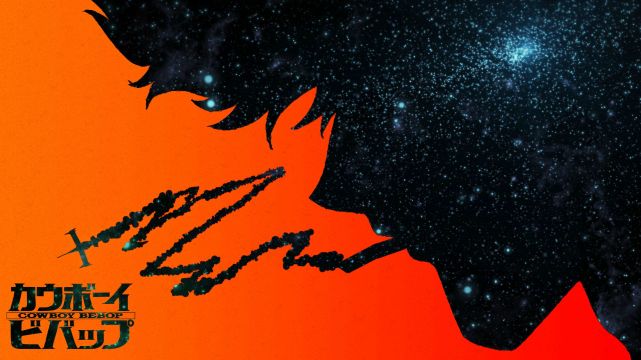
25 – Cowboy Bebop
Cowboy Bebop is an odd show – it’s a story which is capable of fostering powerfully sad emotions, but it never loses its joyful, fun, and adventurous atmosphere. The show’s fantastic jazz soundtrack only contributes to this, with fantastic fast-paced pieces to go alongside the series’ brilliantly directed fights, and more melancholy pieces designed to go with the show’s slower and more contemplative moments. It’s an episodic show, but it uses each episode wonderfully, with each one delivering a new message or more insight into the characters which you’ll grow to love. It probably won’t be on this list much longer, but Bebop is a show which is worth watching for nearly any anime fan.
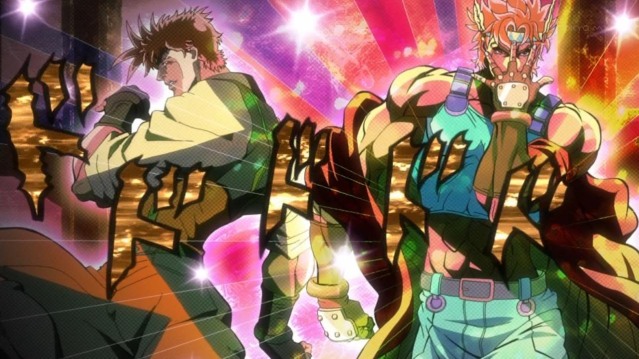
24 – JoJo’s Bizarre Adventure
As the title suggests, JoJo is a show which is incredibly off-kilter. Lacking any of the sensibilities of most anime, JoJo manages to keep things weird while still bringing a long an engaging cast of characters and an intriguing narrative. Its excellent character designs only serve to compliment the ridiculousness of the scenarios the characters are placed in. As the series progresses, it only gets more and more wild in its use of the characters powers and personalities to deliver unique episodes. JoJo is fantastically strange, and it’ll only go up this list as it continues.
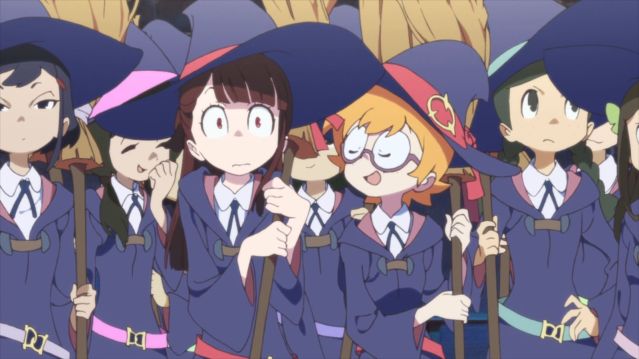
23 – Little Witch Academia
If I had to describe one anime I’ve watched as Disney-esque, Little Witch Academia would be it. Little Witch Academia uses its time perfectly, with both OVAs telling stories about growing up and knowing your limits through fantastic animation and great character designs. Everything in Little Witch Academia is so lovable, and it’s a series that really shows how good anime can be at telling simple stories. Both episodes are incredibly fun to watch, and hopefully the upcoming TV series will be as well.
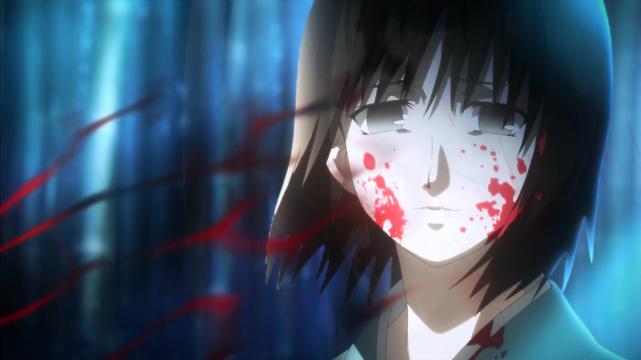
22 – Kara no Kyoukai
KnK could be called pretentious, and I wouldn’t disagree. It’s full of pseudo-philosophical ramblings, and overall comes off as quite juvenile. Nevertheless, it’s one of my favorite series, because everything about it is cool. It’s juvenile, but in many ways I am as well, and it perfectly appeals to the part of me that just likes seeing cool shit. To a young teenager, a power called the “Mystic Eyes of Death Perception” which allows one to kill any object or concept is simply too cool to pass up. When you add Shiki’s legitimately interesting character arc, you end up with what is a very fun series of movies.
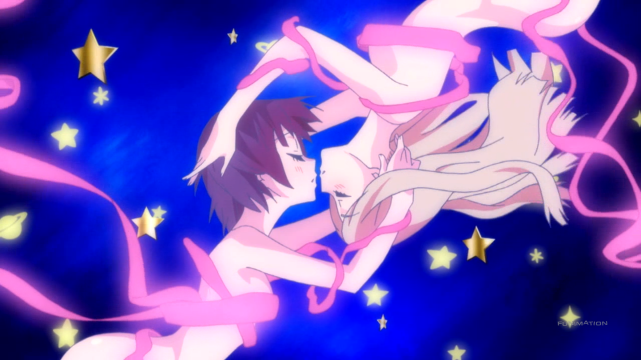
21 – Yuri Kuma Arashi
It isn’t easy being queer, and Kunihiko Ikuhara’s brilliant series knows this. Seemingly a surreal but traditional yuri series, YKA instead rebukes its genre’s trappings, declaring them to be harmful and unrepresentative depictions of actual lesbian relationships. YKA directly tackles the homophobia in Japanese society, and the way society works to exclude those who are open about being different. This is a series dense enough in symbolism to be considered an allegory, but it is a masterful one. This is a series that anyone who wants depth in their anime needs to watch. No other anime will tackle homophobia in such a direct way, while still being caked in symbolism and interprative freedom.
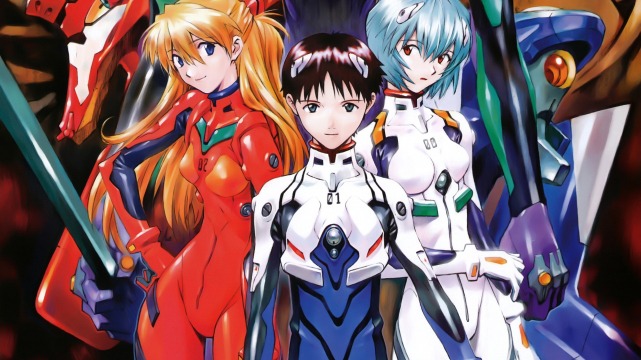
20 – Neon Genesis Evangelion
It’s hard to find a list of top anime that doesn’t have Eva on it, and for good reason. Eva revolutionized the industry, setting standards immediately upon release, and it did so because of how good it was. Evangelion still stands today as one of the most interesting shows ever to be aired. The characters are all incredibly multi-faceted, and entire papers could be written on any one of the main characters alone. When you add its intriguing psychological themes and legitimately strong and emotional story, it stands as one of the best and most important shows ever to be animated.
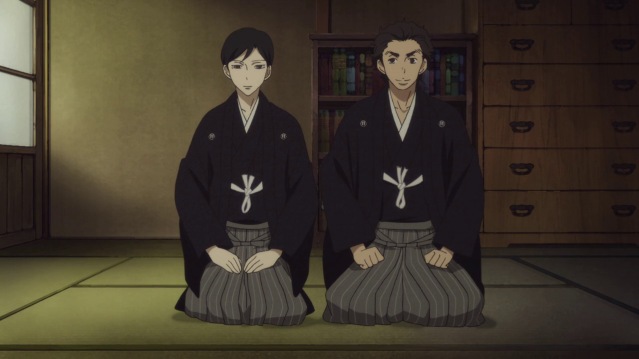
19 – Shouwa Genroku Rakugo Shinjuu
SGRS is the most recent addition to this list, but it sure is deserving. Centering on the dwindling Japanese storytelling art known as rakugo, SGRS chronicles the life of rakugo master Kikuhiko, from his being taken in by a rakugo master at a young age up until taking in his first pupil when he’s past fifty. Rakugo uses voice acting to full effect, with the show’s brilliant voice actors performing so well I became entranced while watching the rakugo performances. The story of Kikuhiko is incredibly gripping, and you’ll always want to know what is happening next. Because the first episode reveals the end of his story, a sense of anticipation looms over the whole show, as you wonder how each event builds up to the ultimate finale. SGRS will be getting another season in 2017, but for now it stands as one of the best shows I’ve ever seen, and I hope that doesn’t change.
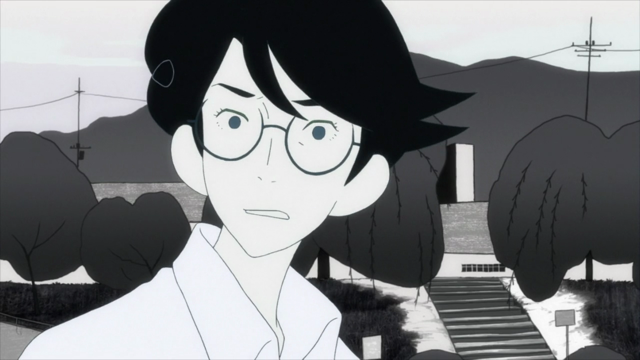
18 – The Tatami Galaxy
When it comes to a show about growing up and finding your interests, Tatami Galaxy is the one to go to. Utilizing a Groundhog Day style time loop, the main character, Watashi, is forced to keep repeating his life in college until he finds something he truly loves. The show has a unique art style and fast-paced dialogue which helps to deliver its powerful themes. The show’s conclusion ties everything up perfectly, and the various scenarios Watashi is put in are all unique and funny, but they manage to feel real and relevant despite that. The Tatami Galaxy teaches you to be realistic and take chances, but also to search for something you really care about, and that’s a very important lesson to teach.
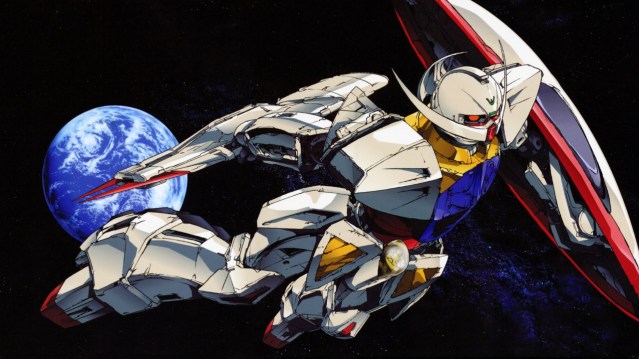
17 – Turn A Gundam
Turn A is hardly a typical Gundam series, and that’s what it allows it to be so good. Set on an Earth which is simultaneously full of mecha yet in the middle of an Industrial Revolution, Turn A shows the war between the Moonrace and the continent of Ameria. Turn A has an excellent OST done by the famous Yoko Kanno, composer of the soundtrack for Cowboy Bebop. Turn A serves as a thematic end to Gundam as a whole, but even without seeing any other Gundam series it stands strong.
Turn A’s protagonist Loran is one of the most consistent and believable of all the Gundam series I’ve watched, and many of the other characters are the same. The conflict has a clearly favorable side at most times, but this side often switches, and members of both major groups are well-represented within the main cast. Turn A is best watched after seeing Tomino’s early UC saga, but it stands as one of the best Gundam anime either way, and it certainly has the most unique setting.
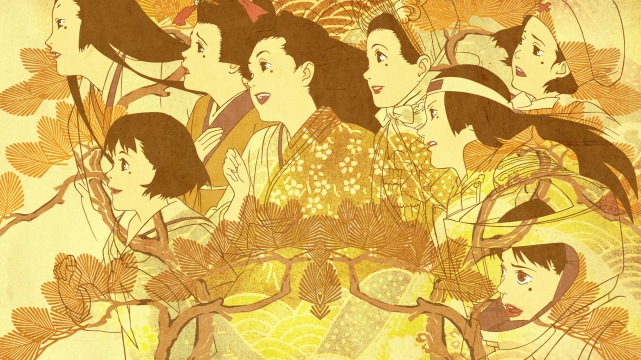
16 – Millennium Actress(Sennen Joyuu)
Never have I seen a movie more beautiful than Millennium Actress. Telling the life tale of one actress through her personal stories and the movies she acted in, this movie is beautiful visually, aurally, and emotionally. The blending of reality and fantasy which is so common in Satoshi Kon’s work is not only present here, it is at its best. The use of the actresses movies in order to show her life story not only makes it more interesting, it allows there to be a certain mysticism to her story, while also allowing for a wider variety of settings. Her existence as an actress is proven through the film’s use of her past work, almost making her story more believable. Love and loss are shown perfectly in Millenium Actress, and that’s why I’ve come to love it so much.
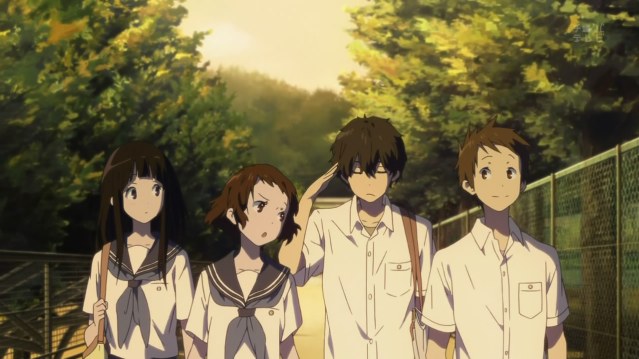
15 – Hyouka
I don’t like putting Hyouka this low on my list, because it only fails by not quite reaching the same heights as the shows which are higher up. Hyouka’s biggest attribute is its visual design, which I would not hesitate to call the best I’ve ever seen in TV anime. Every scene is gorgeously animated, with the characters in particular moving with finesse and meaning. This fantastic character animation is used to accentuate the personalities of the characters and show their thoughts, and it does so expertly. The strong characters are the real heart of Hyouka; while the mysteries are interesting, they serve as a backdrop for Oreki and his journey towards an interest in life. Hyouka has one of the best character arcs I’ve ever seen, and that’s why it stands as one of the greatest anime.
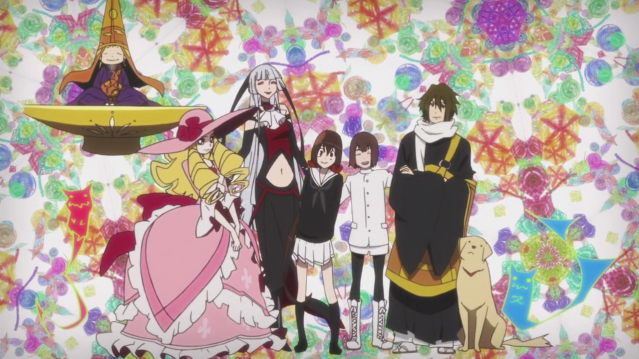
14 – Kyousougiga
I love stories about families. A good family is the base of your entire support network, and they can serve as the people you lean on when you’re in need of help. Kyousougiga is a show which extols the virtues of family, and it does so with fantastic directing and art design. No character in Kyousougiga is perfect. All of them need support at one time or another, and that’s why the existence of all of them is so important. Kyousougiga shows that while individuals may be weak and flawed people, with love for another they can be strong and overcome their own personal issues. That’s a message which anime shows a lot, but Kyousougiga executes it with such a colorful and fun aesthetic and with such clear direction and purpose that I can’t deny it as one of my favorite anime.
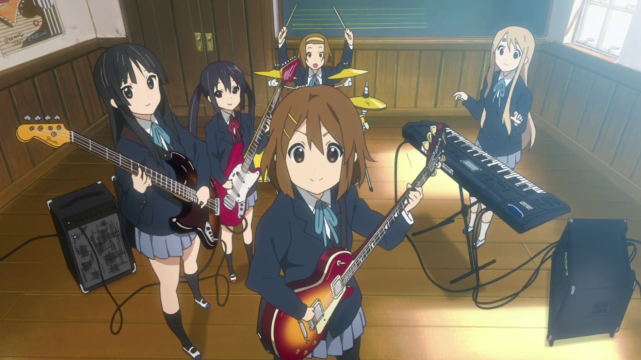
13 – K-On!
K-On is full of cute girls, and they do plenty of cute things in the three years of their lives that we see, but the show is much more than that. K-On speaks to enjoying life for what it is, and it speaks to not getting so serious about something that it ceases to truly be enjoyable. K-On is a character story masquerading as a CGDCT, because its focus is not on the cute circumstances that the characters find them in, but in how this develops them as people and as a group of friends. Anyone who’s finished the second season could tell you how sad the ending is, and that’s because of its main message.
You begin to enjoy the time the characters spend doing nothing not because doing nothing is fun to watch, but because the characters are fun to be around. K-On masters what many slice of life shows only barely manage to do; it truly makes you come to love all of the characters by the end of the series, and care for them as if they were real.
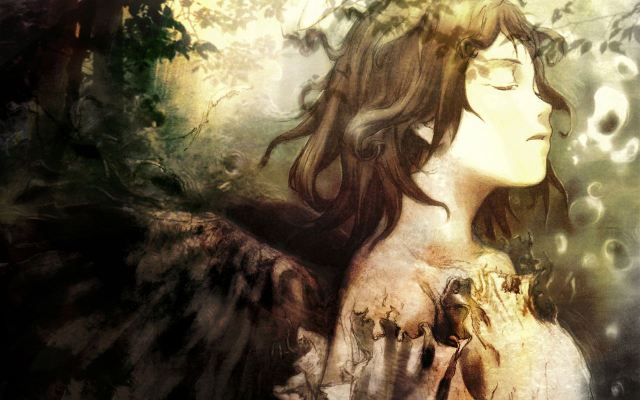
12 – Haibane Renmei
It’s difficult to totally avoid spoiling Haibane when discussing why it’s so good, so this paragraph will spoil the tone while avoiding specific plot details. Haibane Renmei starts off as a well-done iyashikei. It clearly has a more somber and melancholic tone from the very beginning, but it certainly does try to heal you. As the series goes on it changes, but it only improves with its changes. The melancholy fades into dread and depression, and the show becomes much less episodic and focuses more on the two main characters’ lives.
What makes Haibane Renmei so good is that it isn’t dark for the sake of it. Haibane Renmei starts off as an iyashikei series and it ends that way, ultimately ending with a hopeful tone. The characters are beautiful not in spite of, but because of their flaws, as without them they would not be the same. Haibane Renmei can’t be said to be an overall happy series, but it’s one which proclaims that there is always a way to save yourself from your own fears and issues, and that’s what makes it so powerful.
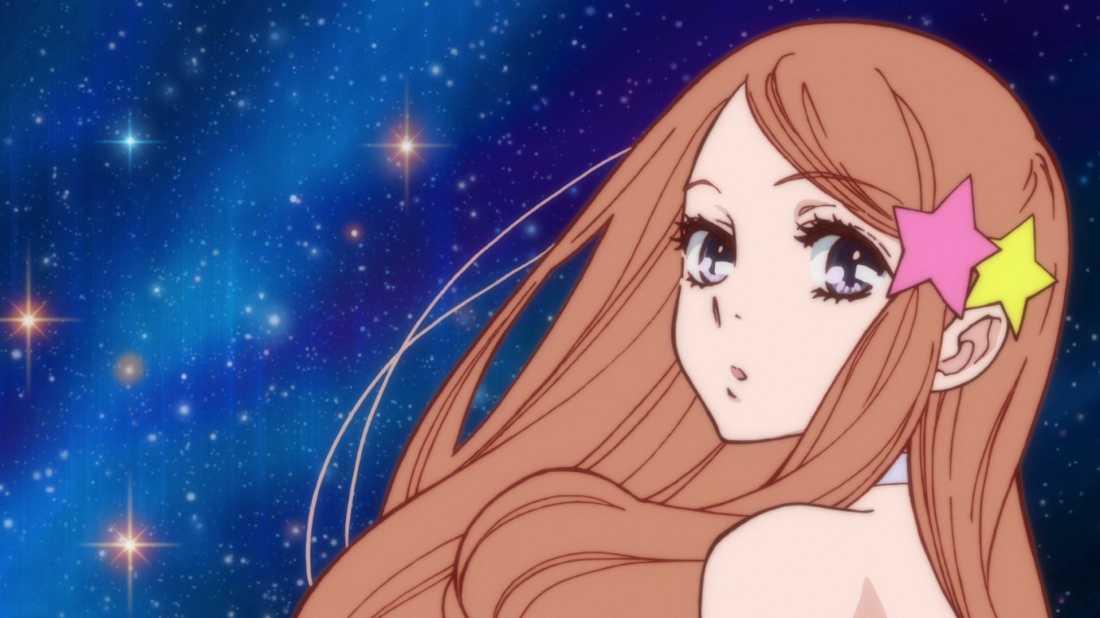
11 – Mawaru Penguindrum
The second Ikuhara show on this list, Penguindrum tells quite a different story from YKA. This is still a show about love, but it’s primarily about familial love rather than romantic love. Everything about Penguindrum is strange, from the premise to the symbolism to the actual acts within the show. But this strangeness which is so characteristic of Ikuhara’s shows only makes Penguindrum all the more able to tell its message. No other show could touch on the importance of family and the pain of losing it while simultaneously tackling the Sarin Gas Attacks and the feelings of those Japanese who grew up during the Lost Decade.
Penguindrum isn’t a show which is easy to understand, but this only makes it all the more valuable as a show to analyze, and even without a full understanding its ability to emotionally affect me was profound. This is sure to move up my list with rewatches, and it’s just another example of how even something which is hard to understand can have deep and intentional meanings buried within.
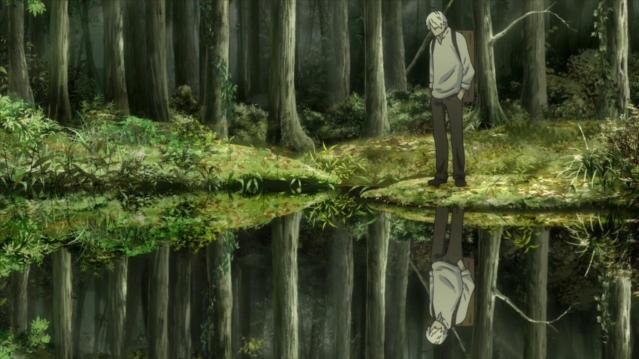
10 – Mushishi
Mushishi is an interesting show. It has a main character, Ginko, but he’s only a side character in a large number of episodes, and no other characters show up more than three or four times in the entire show. You could say it’s a show about seeing the world, but I don’t know if that description does it justice. Mushishi is very slow, and I would call it a somber iyashikei, but it doesn’t fit that label perfectly. Every episode of Mushishi prevents the problems that befall the characters as purely natural things. Very rarely is anyone truly at fault for the various conflicts in Mushishi, but quite often it ends in tragedy regardless.
Because so many episodes end sadly, Mushishi doesn’t exactly heal the viewer all the time. What it does do is grant a look at a life slightly different from ours, but quite similar upon a second glance. Falling ill is something which happens all the time in our world, and no one is to blame for it, but it must be dealt with regardless. Mushishi does better than any other show I’ve seen at simply portraying a natural world, with all the good and bad that can exist within it, even with its fantastical elements.
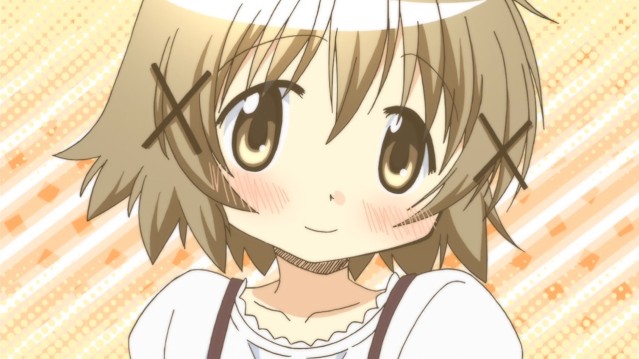
9 – Hidamari Sketch
K-On might not truly be a CGDCT show, but Hidamari Sketch certainly is. That’s not to say nothing happens across the course of the series, but Hidamari Sketch is a much slower, more comedy focused, and less plot-based slice of life show. The slowness at which plot developments occur does not lessen the quality of this series in any way though. The characters that you’re introduced to become instantly likable within a few episodes, and because the show starts after the characters have already met, there’s an immediate sense of chemistry that more plot-based anime couldn’t accomplish right off the bat.
The entire atmosphere of Hidamari Sketch is reflected by the living situation of the characters: every episode feels like you’re just spending some time living with your friends. As I said, Hidamari does have some development, primarily in Yuno’s goal to find what she really wants to do and develop as an artist, something that is very relatable to me and, I assume, to people in general. Overall Hidamari is just an expertly executed CGDCT and iyashikei show with a wonderful aesthetic, and that’s enough to put it this high on my list.
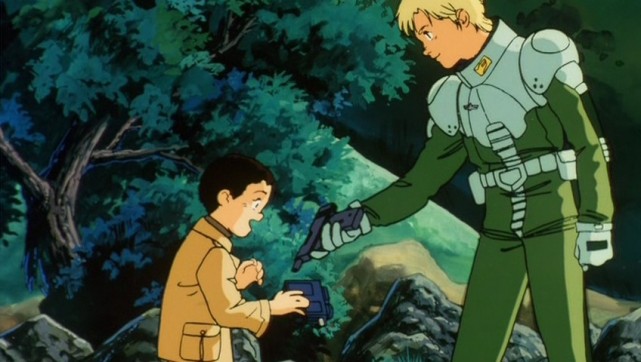
8 – Gundam 0080
Gundam 0080 is a story about war, and why it’s a bad thing. 0080 is a short, 6 episode series, but it’s incredibly focused on delivering its themes in the time it has to do so. The main character, a young boy named Al, comes face to face with the horrors of the One Year War, and doesn’t come out the same. Initially fond of Mobile Suits, by the end of the series he wants nothing to do with them. 0080 illustrates how horrifying war is, and to some extents points out how hypocritical it is for Gundam and other mecha series to decry war while waving around flashy and cool robots which fight in said wars. 0080 is almost entirely standalone from the rest of the Universal Century, which only adds to its value. 0080 is the best mecha series I’ve ever seen, and the only anti-war anime which never feels hypocritical.
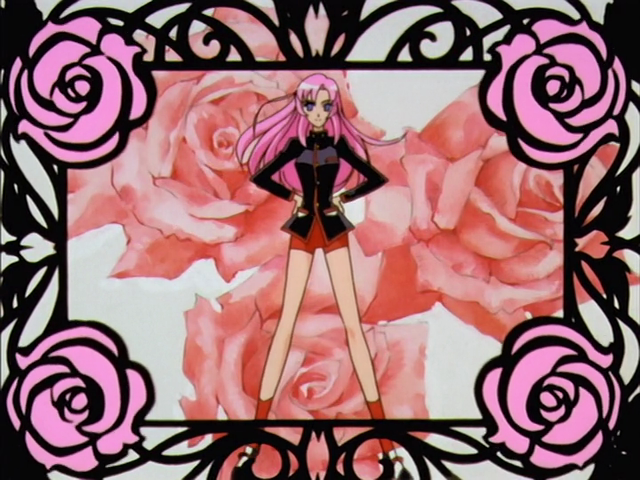
7 – Revolutionary Girl Utena(Shoujo Kakumei Utena)
Utena is a very deep series, and I don’t say that lightly. It should come as no surprise that an Ikuhara series is loaded with symbolism, but compared to his later works it’s relatively tame on that front. For Utena, it is the actual story beats themselves which can be difficult to decipher, but when you figure them out it is very rewarding. Utena tackles a number of things, from gender roles to adolescence to sexuality to puberty, and it covers far more than this over its thirty-nine episode run. Utena is loaded with interpretative freedom, and each of its various arcs could have fifty different meanings to fifty different people. And that’s what makes me love Utena so much. Not only did it give me solid blocks with which to build the themes I wanted to take away from the series, it seemed to encourage me to do build to my heart’s content, and then to come back and rebuild it when I felt ready.
Even with just one watch I’ve come up with a number of interpretations for Utena’s themes, and with more watches even more ideas would come forth. Utena handles everything it works on with great care, never feeling like it goes to far, but it is full of very uncomfortable material. This only accentuates how good it is at executing everything though, as none of these things feel like they do not belong. Utena tells you to put the pieces of the puzzle together, but the pieces are so well made that even if you can’t complete the puzzle you’ll have a good time.
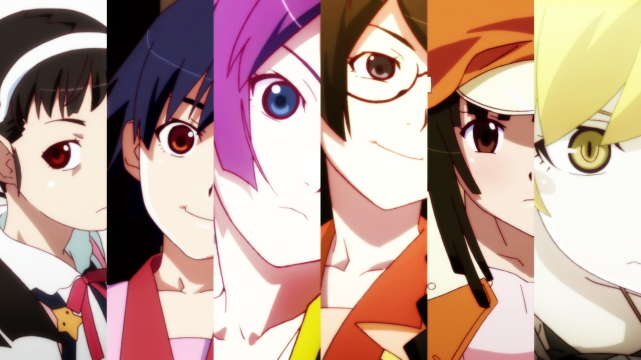
6 – The Monogatari Series
Monogatari is undoubtedly a series which has its characters as its main strength. What’s interesting is that unlike most character focused shows, Monogatari doesn’t have all that much character development. All the characters develop to some extent over the year and a half that the series takes place in, but the focus is less on development and more on interaction and fleshing the characters out further. Most characters only develop in their own arcs, but that’s hardly the only place that they’re interesting. Almost all of the characters are set up with such unique and interesting personalities from the get-go that any time they interact with one another is a good time.
That leads me to the show’s other main strength, the dialogue. Monogatari is known for being wordy, and it certainly is. The characters spend plenty of time with each other exchanging banter or discussing philosophical questions. It works well though, because not only is the dialogue written to be engaging, but the interesting characters each have their own touches. The dialogue actually feels like it’s coming from multiple individuals, and so it doesn’t get boring even when it’s about nothing. Monogatari is a series in which a whole lot of nothing is spoken, but that nothing is enjoyable enough that it frankly doesn’t matter what they’re talking about.
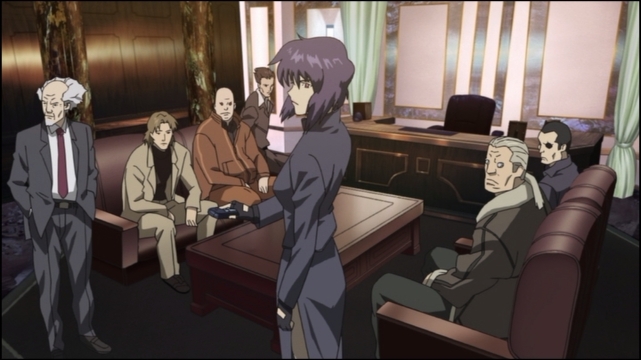
5 – Ghost in the Shell: Stand Alone Complex
Anime isn’t known for its stunning depictions of real life political ideologies, so I was genuinely surprised to see that antagonists in both seasons were anti-capitalists who seemed believable as such. But it isn’t just pandering to my politics which makes me enjoy GITS. The philosophy behind it, namely the questioning of the difference between man and machine is portrayed excellently in Stand Alone Complex, even compared to the movies. This is most evident in the Tachikomas, spider-tanks whose counterparts in the other versions of GITS have relatively simple AI. In SAC these machines evolve to the point where they not only have separate identities, but have truly obtained sapience and all that brings with it, becoming the first AI in this timeline to receive ghosts. Musing on what makes humans what they are is something I’ve always loved, and when it’s done with such careful handling as in GITS I really enjoy it.
GITS does more well than just politics and philosophy though. It has a fantastic soundtrack by Yoko Kanno, and the characters are all interesting. Because they’re all adults who know what they’re doing in life they don’t have that much room to develop, but they’re interesting enough from the get-go that it doesn’t matter much, and they’re still fleshed out as the show goes on. The series’ fantastic format also helps, giving nice breaks from the main plot line while still having a main plot to focus on when needed. All in all GITS:SAC is just an expertly crafted show which deserves to be high on this list.
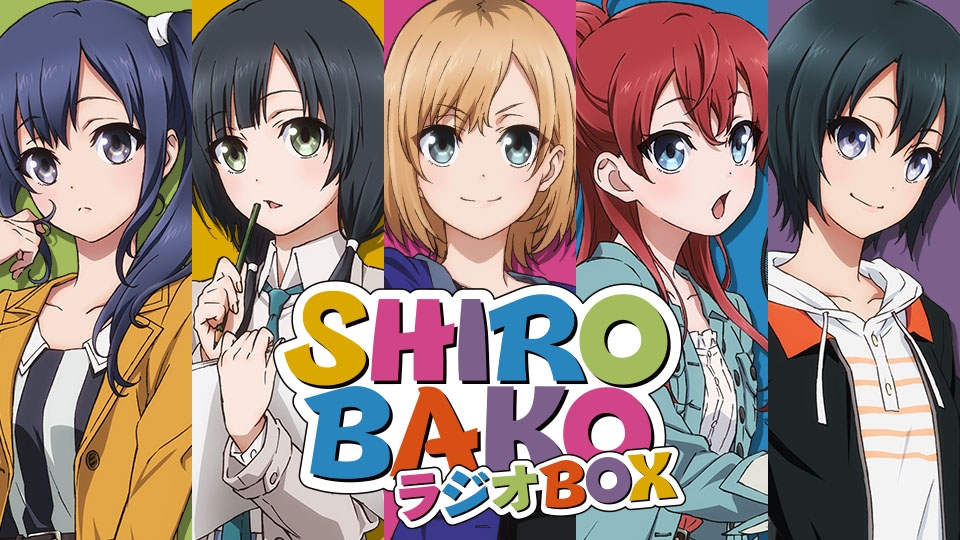
4 – Shirobako
You could say that Shirobako deserves to be an anime more than any other show on this list. While nearly every show on hear uses the medium quite well and couldn’t be told the same way in another medium, none of them feel as intrinsically bound up in being anime as Shirobako. After all, Shirobako is a show about anime, and it being anime only makes it so better at telling its story.
Shirobako’s use of the medium obviously isn’t its only strength though, or it wouldn’t be this high up. What really makes Shirobako matter to me is the specific trials its main character, Miyamori Aoi, has to go through. I haven’t had a job yet, but when she just goes with the flow and keeps doing what she’s been doing while trying to figure out what it is she really wants, it rings very true to me. I’ve said before this point that I’ve spent a lot of time trying to figure out what it is I really want to do, and who I really want to be. I have plenty of time to keep thinking about it, but I can sympathize with Aoi, and generally all of the main five girls so easily because to some extent I’m going through the same thing.
When we get back to how the show uses the medium, it stays up to par. It has great character designs which don’t feel to unrealistic for the show’s mostly realistic setting, but still come across as very anime-looking, particularly in the eyes. The voice acting is great, and its use of new voice actors for the main girls’ roles fit thematically.
Last but not least, Shirobako is quite informative. It obviously stretches the truth in various ways in order to tell a compelling story, but its depiction of the anime production schedule isn’t far off from how bad it really is. As long as you make sure to fact check, Shirobako serves as a legitimately useful source of information for the industry as a whole.
When you combine all of these elements it’s easy to see why I’d care about Shirobako, but even if Miyamori’s struggles didn’t compel you, the show’s other elements are so well done that I doubt there are too many who actively dislike this show.
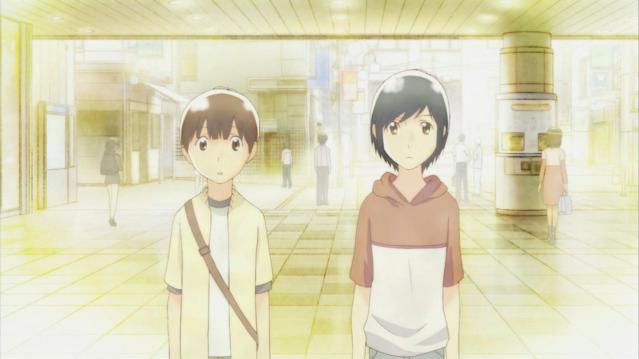
3 – Wandering Son(Hourou Musuko)
Wandering Son is a show about many things. It’s about growing up, about not fitting in, about young love, about friendship, and about identity, specifically gender identity. It’s a show which is very dense, and uses all of the time it has perfectly. The entire show is framed almopst like a play or a storybook, with washed out colors, white around the borders of the screen, and very theatrical shot composition. It looks amazing, and it all helps to contribute towards the tone that the show is going for.
Wandering Son simply isn’t like most anime. The visual design that I mentioned previously is part of it, but there’s more to it than that. The first is that it tells a story that simply doesn’t exist in any other anime. There is literally no other anime focused on a trans girl and her life. It doesn’t exist, and even in the realm of manga there are few series with that basic premise. What’s more is that the show actually handles this well. Rather than using Shuu, the main character, as a joke, she’s treated quite favorably. That’s not to say every character is nice to her, and many including her sister are in fact hostile towards her gender, but the series itself is never mean about it.
Most of all, Wandering Son feels very real, which is a bit odd to say considering how theatrical it is. The characters are often petty or mean, but they’re all middle schoolers. Shuu and her friends’ struggles are all ones that anyone who shares any similarities with any of them can easily sympathize with, and even if you haven’t there’s surely some similarities there. Few people have a great time in middle school, so a story depicting characters’ lives in it can more easily garner sympathy.
I have more to say about Wandering Son in the future. I plan on eventually writing something for it, but for now I’ll leave it at this. Wandering Son is a show I wish everyone would watch. They should read the manga as well.
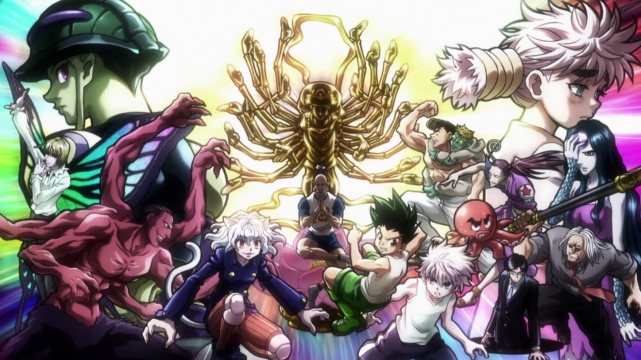
2 – Hunter x Hunter (2011)
No other battle shounen anime can compare to Hunter x Hunter, and outside of my number one pick no other anime has even come close to HxHs level, because Hunter x Hunter is, simply put, a masterpiece. This is a show which truly shows the brilliance of writing that anime can have. The entire show is amazing, but it’s far too long for me to discuss every arc here, and so I will focus on my favorite one: the Chimera Ant arc.
The Chimera Ant arc is a tonal shift from the arc that comes before it. The show had been dark in some previous arcs, but overall the show at this point had an overall cheery and hopeful tone. This arc is where that ended. The Chimera Ant arc is perhaps the best depiction of conlict that I’ve ever seen in an anime. Gundam 0080 has the best depiction of war, because what happens in the beginning of this arc can hardly be called a war. This is a slaughter, and humans can’t put up any real resistance to the wrath of the Chimera Ants.
It is from here that one of the best executed “humans are the real monsters” stories begins. These kinds of stories usually tire me, because they feel unnecessarily pessimistic. What Hunter x Hunter does right, is that by saying humans are worse than the Chimera Ants it never says humans are terrible. We do terrible things, but the Chimera Ants are shown to be very capable of good, just as we are. Hunter x Hunter doesn’t get overly misanthropic, which makes this philosophical plotline feel well-done rather than pointlessly cynical.
And that’s not to mention the emotional impact of this arc. I can’t go into too much detail without spoiling the whole thing, but the main characters’ developments reach their head in this arc, and it’s done wonderfully. Gon’s ridiculous worldview is more thoroughly explored, and Killua continues his path towards being a better person. When you include Meruem, who I would consider one of the best antagonists of all time, and his massive development over the thirty to fourty episodes he’s in, this arc is full of brilliant characters.
Hunter x Hunter is good in every arc, even though Chimera Ant is the best. It has a broad range of tones, and it uses these to great effect by changing them up every arc.
The show also knows how to use powers correctly. The characters are introduced to their powers slowly, and take visible amounts of time to learn how to use them. Other characters who’ve had them for longer show much better usage, and the powers are used in creative ways to make sure that the fights truly make use of them.
All in all, there isn’t much Hunter x Hunter could do better. If action series were my preffered genre instead of iyashikei, I have no doubt that Hunter x Hunter would be my favorite anime. For now it’s number two, but that’s still plenty good.
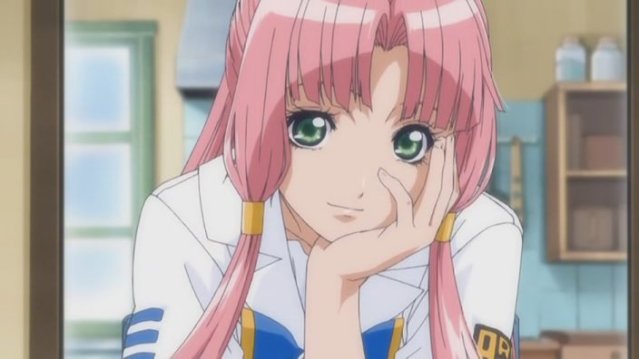
1 – Aria
Aria is perfect. I didn’t talk about them much, but every other show on this list has flaws. For those in my top 10, those flaws were incredibly minor and probably didn’t detract much, but they were there. To me, Aria has no flaws, because my love for it is so intense that any possible flaws it could have become postives to me. No matter what the show does, I love it so much that I’m more endeared to it by the second, and something that would get on others’ nerves doesn’t bother me at all. To be blunt, Aria has shaped my taste to such an extent that it is the platonic ideal of perfection, and therefore it can’t have flaws.
Aria had to get me on board at one point though, before I viewed it as perfect, so how did it do that? Well, initially I loved it for the tone. Aria is a true iyashikei, frequently seen as the quintessential example of the genre, and this comes through when you watch it. It truly is a show about nothing, at least most episodes, but this is just part of the charm. Every minute you spend watching the show makes you feel like you’re getting to know the characters and the beautiful city of Neo-Venezia just a bit better.
Aria is set in a utopia. There are no major conflicts in Neo-Venezia, and by and large everybody is happy. This isn’t a world that exists, and a world this perfect likely never will, but it does inspire you. Aria helped break me out of a period in which I was perpetually cynical, and opened my eyes to the fact that despite all of the problems in the world, it’s a world full of good that can be made even better. Every episode drills in the point that there are wonderful things in this world if you open your eyes and look for them, and at the time I first watched Aria I really needed this.
However, until the final season of Origination, Aria was not perfect. It was very good, but at the time I definitely felt it did have flaws, though I can’t remember what they were anymore. What made it perfect was the show’s resolution. Origination resolved the show’s general themes of appreciating what you have while you have it and moving on that it moved me to tears just writing this. In light of Origination’s conclusion, everything fit. All the small issues I had with the series were no longer issues, because they all were part of this wonderful experience which culminated in Origination.
Ever since, I’ve loved every bit of Aria. I love how the music contributes to the happy and peaceful mood of Neo-Venezia. I love how the city of Neo-Venezia is just as important as any of the other characters. I love Akari, and I love how easy it is for her to appreciate the most mundane of things and make friends with the most unrelated of people. I love the themes of the series, and I love the way they’re delivered. I love the comedy and the stupid chibi faces that the characters use for reactions. I love everything in this series, and I don’t think that’ll change. Aria isn’t just my favorite anime. It’s my favorite piece of art, and it means more to me than most things in this world ever will. Outside of people I’ve known and real life situations I’ve been in, nothing has had a bigger impact on me. Aria could probably never mean the same thing to anyone else that it means to me, but Aria is perfection itself to me, and I doubt it will ever drop on this list.
Great list! I couldn’t help but wonder though–have you seen Welcome to the NHK?
LikeLike
I have, though it’s been a while. Its pretty close to this, and it might rejoin the list if I were to rewatch it, but for now it’s a bit below.
LikeLike
Oh I see! Thanks for replying. For me, the relatable experiences of it makes it one of the most important anime I’ve seen.
I want to mention that I gave the list a closer look while wondering why K-On wasn’t up higher and thoroughly enjoyed the differences in our tastes. I’ll be using this list as a recommendation that I actually find intriguing!
Oh, another thing–what about Madoka?
LikeLike
Madoka is another case of it being too long ago. This was written before I last watched K-On, it’s sure to be higher when I remake this, which should be in the next few months.
LikeLike
Okay! Looking forward to it 🙂
LikeLike